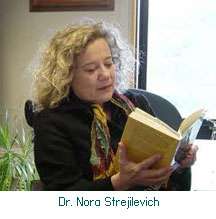 Sedona AZ (December 29, 2011) – On Friday, January 6, 2012 Sedona Public Library will host the lecture The Works of Memory by Dr. Nora Strejilevich at 6pm in the Si Birch Community Room. Dr. Strejilevich will be sharing her life experiences in her testimonial books A Single Numberless Death, and El arte de no olvidar (The Art of Not Forgetting).
Sedona AZ (December 29, 2011) – On Friday, January 6, 2012 Sedona Public Library will host the lecture The Works of Memory by Dr. Nora Strejilevich at 6pm in the Si Birch Community Room. Dr. Strejilevich will be sharing her life experiences in her testimonial books A Single Numberless Death, and El arte de no olvidar (The Art of Not Forgetting).
Nora Strejilevich is an Argentine-Jewish writer and poet who became a survivor of a concentration camp in Argentina during the time known as “Dirty War” (1976-83). After her liberation in 1977 she was granted political asylum in Canada where she completed a Ph.D. in Latin American Literature at the University of British Columbia. Her own witness account is representative of the testimonial genre and of the paradigm that implies the intersection between fiction and reality.
 Nora was a young woman when her brother and other family members and friends disappeared at the hands of the military regime that held power in Argentina from 1976 to 1983. Allegedly part of a systematic campaign to eliminate left-wing terrorism, the violence perpetrated by the army far exceeded anything imaginable. It brutally harassed not only anyone suspected of sympathizing with leftist ideas but other dissidents and innocent civilians as well, and particularly targeting the Jewish population.
Nora was a young woman when her brother and other family members and friends disappeared at the hands of the military regime that held power in Argentina from 1976 to 1983. Allegedly part of a systematic campaign to eliminate left-wing terrorism, the violence perpetrated by the army far exceeded anything imaginable. It brutally harassed not only anyone suspected of sympathizing with leftist ideas but other dissidents and innocent civilians as well, and particularly targeting the Jewish population.
Dr. Strejilevich survived kidnapping and torture to speak of her experience with a dignified voice and a clear-eyed realism. A Single, Numberless Death narrates her story and the tragic destiny of her generation: the disappearance of 30,000 people, including her family members, and her exile in different countries. The author will be sharing with us these experiences in three stages: kidnapping, liberation, and fight for human rights. Above all, this novel is Nora Strejilevich’s gripping story of survival.
Dr. Strejilevich’s work has been awarded the University of Alberta Literary Award (1982), the York University Literary Award (1990), the “Letras de Oro” National Literary Prize in Hispanic Literature (1997), and the Howard Translation Grant for the translation of Una sola muerte numerosa / A Single Numberless Death (2002). This testimonial novel has given her international recognition. It was adapted to theatre in the U.S. (2002), and it inspired the movie Nora in Italy (2005). This text has been also incorporated into the curriculum of graduate studies in universities in Argentina, Mexico, Brazil, Germany, Austria, and France.
Strejilevich has published prose, poems and essays. Currently, she is devoting herself to creative writing, research, and International Human Rights activism. Her most recent project is the study of women’s resistance to totalitarian regimes through art.
The Works of Memory in Contemporary Argentina: A Testimony by Dr. Nora Strejilevich
On Friday, January 6, 2012 Sedona Public Library will host the lecture The Works of Memory by Dr. Nora Strejilevich at 6pm in the Si Birch Community Room. Dr. Strejilevich will be sharing her life experiences in her testimonial books A Single Numberless Death, and El arte de no olvidar (The Art of Not Forgetting).
Nora Strejilevich is an Argentine-Jewish writer and poet who became a survivor of a concentration camp in Argentina during the time known as “Dirty War” (1976-83). After her liberation in 1977 she was granted political asylum in Canada where she completed a Ph.D. in Latin American Literature at the University of British Columbia. Her own witness account is representative of the testimonial genre and of the paradigm that implies the intersection between fiction and reality.
Nora was a young woman when her brother and other family members and friends disappeared at the hands of the military regime that held power in Argentina from 1976 to 1983. Allegedly part of a systematic campaign to eliminate left-wing terrorism, the violence perpetrated by the army far exceeded anything imaginable. It brutally harassed not only anyone suspected of sympathizing with leftist ideas but other dissidents and innocent civilians as well, and particularly targeting the Jewish population.
Dr. Strejilevich survived kidnapping and torture to speak of her experience with a dignified voice and a clear-eyed realism. A Single, Numberless Death narrates her story and the tragic destiny of her generation: the disappearance of 30,000 people, including her family members, and her exile in different countries. The author will be sharing with us these experiences in three stages: kidnapping, liberation, and fight for human rights. Above all, this novel is Nora Strejilevich’s gripping story of survival.
Dr. Strejilevich’s work has been awarded the University of Alberta Literary Award (1982), the York University Literary Award (1990), the “Letras de Oro” National Literary Prize in Hispanic Literature (1997), and the Howard Translation Grant for the translation of Una sola muerte numerosa / A Single Numberless Death (2002). This testimonial novel has given her international recognition. It was adapted to theatre in the U.S. (2002), and it inspired the movie Nora in Italy (2005). This text has been also incorporated into the curriculum of graduate studies in universities in Argentina, Mexico, Brazil, Germany, Austria, and France.
Strejilevich has published prose, poems and essays. Currently, she is devoting herself to creative writing, research, and International Human Rights activism. Her most recent project is the study of women’s resistance to totalitarian regimes through art.



